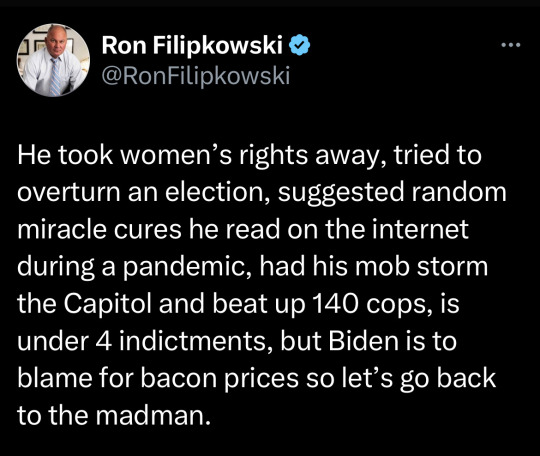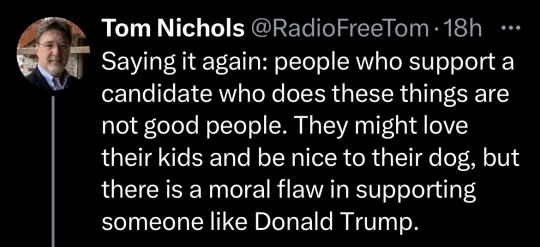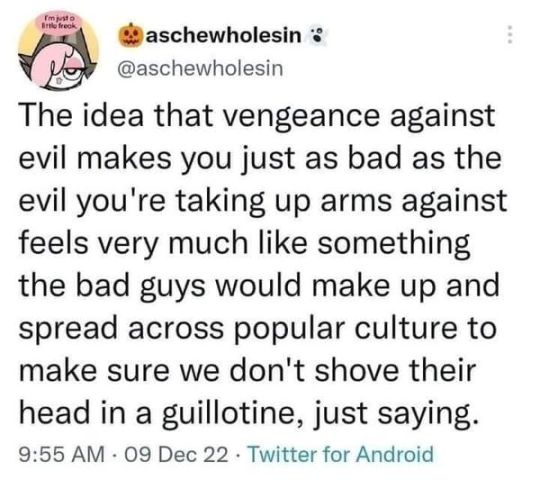#morality
Text
The Morality Of Hiroshima And Nagasaki
A small debate has arisen in Conservative circles over the morality of the bombing of Hiroshima and Nagasaki. One side proclaims that the decision was evil because it targeted innocent civilians on a massive scale (regardless of how many lives it may have saved) and furthermore anyone who will not denounce the decision is evil themselves. The other side declares that it was a moral decision because it saved more lives than it claimed. Now one error that many critics of the decision seem to make is that they speak as though this was a choice between the deaths of the innocent civilians of these two cities, and the deaths of a larger number of armed troops on both sides. It was not. If it were it would be an easier decision.
The first thing that needs to be acknowledged is that, like contemporary discussions of slavery, this is a discussion of a different moral climate. Innocent civilians were not merely targeted by the hydrogen bomb but were regularly targeted by conventional bombs during the war in a way that would be entirely unthinkable today. Entire cities were bombed out. Hundreds of thousands of innocent civilians were killed in German cities alone. So the grim practical choice here was between years and years of more targeted conventional bombing of innocent civilians, or these two acts against Hiroshima and Nagasaki.
If I were personally sent back in a time machine and given the power to make this decision I could not, for I am a product of a different time. The question is whether or not, within the context of that time, this was the best decision. In my opinion it was for the time. Some will object to my claim that this was a different moral climate by pointing out statements of the era that express an awareness of the evil of targeting civilians. But we can do the same thing with slavery. Every single major founding father is on record condemning the institution of slavery as grossly immoral. This does not change the fact that it was a different moral climate; for in today's Western world the very notion of slavery is unthinkable.
The targeting of civilians was not some extreme deviation peculiar to World War 2 either. It was practiced in World War 1, and in most earlier wars, indicating that the extreme taboo against it presently is indeed a convention of the modern world.
32 notes
·
View notes
Text
"The idea of reforming Omelas is a pleasant idea, to be sure, but it is one that Le Guin herself specifically tells us is not an option. No reform of Omelas is possible — at least, not without destroying Omelas itself:
If the child were brought up into the sunlight out of that vile place, if it were cleaned and fed and comforted, that would be a good thing, indeed; but if it were done, in that day and hour all the prosperity and beauty and delight of Omelas would wither and be destroyed. Those are the terms.
'Those are the terms', indeed. Le Guin’s original story is careful to cast the underlying evil of Omelas as un-addressable — not, as some have suggested, to 'cheat' or create a false dilemma, but as an intentionally insurmountable challenge to the reader. The premise of Omelas feels unfair because it is meant to be unfair. Instead of racing to find a clever solution ('Free the child! Replace it with a robot! Have everyone suffer a little bit instead of one person all at once!'), the reader is forced to consider how they might cope with moral injustice that is so foundational to their very way of life that it cannot be undone. Confronted with the choice to give up your entire way of life or allow someone else to suffer, what do you do? Do you stay and enjoy the fruits of their pain? Or do you reject this devil’s compromise at your own expense, even knowing that it may not even help? And through implication, we are then forced to consider whether we are — at this very moment! — already in exactly this situation. At what cost does our happiness come? And, even more significantly, at whose expense? And what, in fact, can be done? Can anything?
This is the essential and agonizing question that Le Guin poses, and we avoid it at our peril. It’s easy, but thoroughly besides the point, to say — as the narrator of 'The Ones Who Don’t Walk Away' does — that you would simply keep the nice things about Omelas, and work to address the bad. You might as well say that you would solve the trolley problem by putting rockets on the trolley and having it jump over the people tied to the tracks. Le Guin’s challenge is one that can only be resolved by introspection, because the challenge is one levied against the discomforting awareness of our own complicity; to 'reject the premise' is to reject this (all too real) discomfort in favor of empty wish fulfillment. A happy fairytale about the nobility of our imagined efforts against a hypothetical evil profits no one but ourselves (and I would argue that in the long run it robs us as well).
But in addition to being morally evasive, treating Omelas as a puzzle to be solved (or as a piece of straightforward didactic moralism) also flattens the depth of the original story. We are not really meant to understand Le Guin’s 'walking away' as a literal abandonment of a problem, nor as a self-satisfied 'Sounds bad, but I’m outta here', the way Vivier’s response piece or others of its ilk do; rather, it is framed as a rejection of complacency. This is why those who leave are shown not as triumphant heroes, but as harried and desperate fools; hopeless, troubled souls setting forth on a journey that may well be doomed from the start — because isn’t that the fate of most people who set out to fight the injustices they see, and that they cannot help but see once they have been made aware of it? The story is a metaphor, not a math problem, and 'walking away' might just as easily encompass any form of sincere and fully committed struggle against injustice: a lonely, often thankless journey, yet one which is no less essential for its difficulty."
- Kurt Schiller, from "Omelas, Je T'aime." Blood Knife, 8 July 2022.
#kurt schiller#ursula k. le guin#quote#quotations#the ones who walk away from omelas#trolley problem#activism#introspection#discomfort#reform#revolution#suffering#ethics#morality
10K notes
·
View notes
Text
relapse is not a moral failure. substance use and addiction are not a moral failure. mental illness is not a moral failure. disability is not a moral failure. you have a health condition. you are struggling. recovery is not mean to be perfect, and if you're not in recovery, surviving is good too. i'm glad you're here, and i hope life treats you better soon. please know this is not your fault. you do not need to feel guilty over your own health.
#messages to myself#<- still ok to rb#softspoonie#addiction#addiction recovery#mental health#mental health positivity#morality#ableism#sanism#mentally ill#mental illness#physical illness#physical health#disability positivity#mental health recovery#mental illness recovery#recovery#positivity#substance use#substance misuse#substance abuse#substance use disorder
4K notes
·
View notes
Text


#Republicans#gop#donald trump#donald john trump#joe biden#vote biden#throw them out#conservative nightmares#worst of the worst#morality#bad people
2K notes
·
View notes
Text

5K notes
·
View notes
Text
We ask your questions so you don’t have to! Submit your questions to have them posted anonymously as polls.
#polls#incognito polls#anonymous#tumblr polls#tumblr users#questions#polls about ethics#submitted nov 27#prison#ethics#morality#society#ideology#crime
959 notes
·
View notes
Quote
Wherever there are politics or economics no morality exists.
Friedrich Schlegel, Ideas
686 notes
·
View notes
Text
Saturn has 83 moons. 63 moons are confirmed and named, and another 20 moons are awaiting confirmation of discovery and official naming.
This is their dynamic visualization while they travel with Saturn through space
#physics#astronomy#science#quantummechanics#quantum mechanics#stoicism#society#psychology#ethics#morality
776 notes
·
View notes
Text
#I’m genuinely curious on people’s thoughts on this#the answer determines how fucked we are?#morality
633 notes
·
View notes
Text
One of my best friends went to college in Montana. They were part of the campus queer community. They had a friend who had been stalked and harassed by this guy on Grindr multiple times. When my friend ask them why nothing had been done, why this guy hadn't been ousted from the community, their friend simply said:
"No. We can't do that. That's the same as leaving him for dead."
And they were right for that.
There's a lot of personal reasons I found it in me to forgive my ex that assaulted and closeted me - but another reason is because they were also a hurting, closeted, queer kid who took their pain out on me. They deserve safe communities to heal in and I am not the arbiter of that. There's a reason why my best friend is still my best friend in spite of the fact that they hurt someone in similar but different ways - that I will not disclose further for their privacy. My best friend deserves to heal and so does the person they hurt. No one else is the arbiter of whether or not either one of them is allowed that.
I hate Blaire White, Caitlyn Jenner, Kalvin Garrah, etc. etc. etc. as people. I would never hold community space for them in a typical queer setting. However, if their existences as trans people were under attack? I would still hold space for them even if they would never hold that for me because that's still the right thing to do. That value stands for me personally across all marginalized people - not just trans people.
Absolutely make your personal spaces safe for yourself. Curate your own online experience. But when shit goes down, you still stand up for the queers you don't like. The queers who've hurt people. Who've hurt you even. Because ultimately you are socially the same. Bigotry is bigger than all of us and that's a tough pill to swallow, but you have to swallow it or we are all fucked.
520 notes
·
View notes
Text


I was having really bad artblock and apparently going back to my roots helped with that,, so have Patton from the new sander asides video!
#digital art#colored sketch#artists on tumblr#sketch#fanart#sanders sides#sander asides#patton sanders#sander sides fanart#sander sides patton#thomas sanders#thomas sanders fanart#morality sanders#morality#my art
513 notes
·
View notes
Text

Junya Watanabe 'Morality' Poem Black Jacket Spring/Summer 2010
1K notes
·
View notes
Text
We ask your questions so you don’t have to! Submit your questions to have them posted anonymously as polls.
#polls#incognito polls#anonymous#tumblr polls#tumblr users#questions#polls about people#submitted nov 26#polls about ethics#morality#ethics#philosophy#humanity
706 notes
·
View notes
Text
the existence of healthy fat people is not the reason fat people should be allowed to exist, and free of bigotry at that. it uses health as a measure of someone's rights, and health is morally neutral. it also very much sidelines fat people whose fatness DOES negatively impact their health. that's a thing that can happen, and it still doesn't mean they have an obligation to lose weight. we must accept and fight for all fat people, whether they're disabled or not.
#softspoonie#fat pride#fat people#fatness#ableism#body acceptance#body neutrality#disabled#disability advocacy#morality#disability#disabled rights#disability rights#chronic illness#chronically ill#fatphobia
450 notes
·
View notes
Text
Wrong does not cease to be wrong because the majority share in it.
Leo Tolstoy, A Confession
405 notes
·
View notes